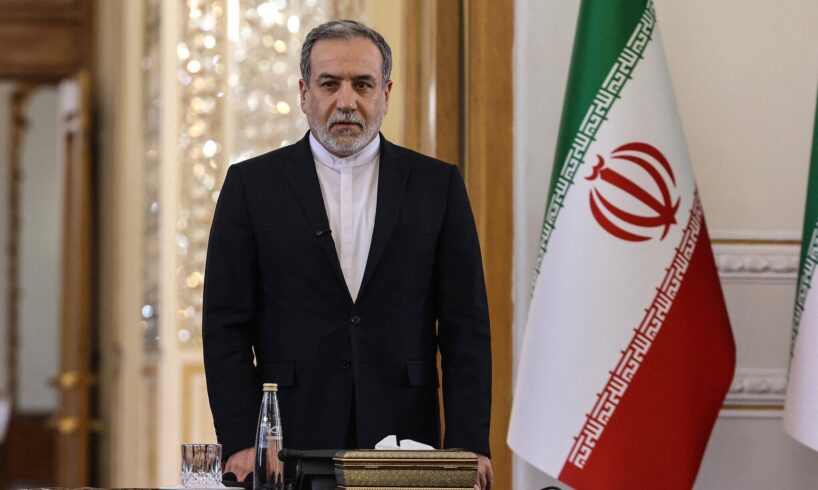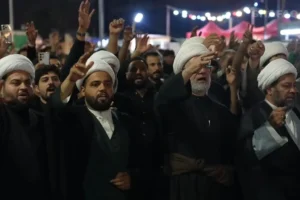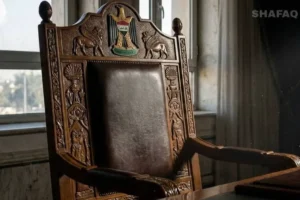
Iran dismissed the idea that it would establish diplomatic ties with Israel, describing the idea on Saturday as “wishful thinking.”
The statement came nearly two weeks after US President Donald Trump suggested that the Islamic Republic could normalize relations with Israel after decades of calling for its elimination.
“The Abraham Accords are amazing,” Trump said at a White House press conference last month with Prime Minister Benjamin Netanyahu, referring to the normalization agreements he brokered in 2020 between Israel and four Arab countries.
Shortly afterward, he added, “Maybe even Iran can get in there. We hope we’re going to be able to get along with Iran. I think they’re going to be open to it. I really believe that. But they could be a member.”
Trump made the comments while announcing a ceasefire deal in the Israel-Hamas war in Gaza, which took effect on Friday. Iran has praised the agreement. But its foreign minister, Abbas Araghchi, said on Saturday that Iran would not recognize Israel.
Get The Times of Israel’s Daily Edition
by email and never miss our top stories
By signing up, you agree to the terms
“Iran will never recognize an occupied regime that has committed genocide and killed children,” Araghchi told Iranian state television.
People walk in front of a billboard depicting slain Lebanese Hezbollah leaders Hassan Nasrallah (C) and his successor Hashem Safieddine (R) as well as the late Iranian General Qasem Soleimani, in Tehran, Iran, on September 28, 2025. (ATTA KENARE / AFP)
Iran had relations with Israel prior to the 1979 Islamic Revolution, and if Tehran did decide to reestablish ties, it would be a stunning about-face. Iran’s leaders have called for Israel’s destruction and funded an axis of terror groups that have attacked Israel, including Hamas, which carried out the October 7, 2023, massacre in Israel that launched the war in Gaza.
Israel has also long been committed to denying Tehran the ability to obtain nuclear weapons. In June, Israel carried out a sweeping assault on Iran’s top military leaders, nuclear scientists, uranium enrichment sites, and ballistic missile program — an attack it said was necessary to prevent the Islamic Republic from realizing its vows to destroy Israel.
Iran has consistently denied seeking to acquire nuclear weapons. However, it enriched uranium to levels that have no peaceful application, obstructed international inspectors from checking its nuclear facilities, and expanded its ballistic missile capabilities. Israel said Iran had recently taken steps toward weaponization.
Iran retaliated to Israel’s strikes by launching over 500 ballistic missiles and around 1,100 drones at Israel. The attacks killed 31 people and wounded over 3,000 in Israel, according to health officials and hospitals.
A domestically-built missile “Khaibar-buster,” and banners showing portraits of the Iranian Supreme Leader Ayatollah Ali Khamenei, center, and the late armed forces commanders, who were killed in Israeli strike in June, are displayed in a military exhibition commemorating the anniversary of the start of the 1980-88 Iraq-Iran war, and 12-day war with Israel in June, at Baharestan Square, in Tehran, Thursday, Sept. 25, 2025. (AP Photo/Vahid Salemi)
The US joined the attack on Iran’s nuclear facilities at the end of the war. That attack followed several unsuccessful rounds of negotiations between Iran and the US over Iran’s nuclear program.
On Saturday, Araghchi said Tehran would consider reentering talks with the US.
“If we receive a reasonable, balanced, and fair proposal from the Americans for negotiations, we will certainly consider it,” he told state television.
However, Araghchi said Iran will not give up its “right to enrich uranium” but can take confidence-building measures regarding “the peaceful nature of its nuclear program.”
Araghchi also said that Iran had received a message relayed by Russia indicating that Israel did not want any new confrontation with his country.
“Apparently, three or four days ago, there was a telephone call between Netanyahu and [Russian President Vladimir] Putin,” he said.
“Netanyahu emphasised that he had no intention of restarting a war with Iran,” Araghchi said, adding that the message was relayed to Tehran’s ambassador in Russia.
Is The Times of Israel important to you?
If so, we have a request.
Every day, even during war, our journalists keep you abreast of the most important developments that merit your attention. Millions of people rely on ToI for fast, fair and free coverage of Israel and the Jewish world.
We care about Israel – and we know you do too. So today, we have an ask: show your appreciation for our work by joining The Times of Israel Community, an exclusive group for readers like you who appreciate and financially support our work.
Yes, I’ll give
Yes, I’ll give
Already a member? Sign in to stop seeing this
You appreciate our journalism
You clearly find our careful reporting valuable, in a time when facts are often distorted and news coverage often lacks context.
Your support is essential to continue our work. We want to continue delivering the professional journalism you value, even as the demands on our newsroom have grown dramatically since October 7.
So today, please consider joining our reader support group, The Times of Israel Community. For as little as $6 a month you’ll become our partners while enjoying The Times of Israel AD-FREE, as well as accessing exclusive content available only to Times of Israel Community members.
Thank you,
David Horovitz, Founding Editor of The Times of Israel
Join Our Community
Join Our Community
Already a member? Sign in to stop seeing this





